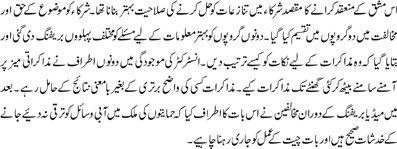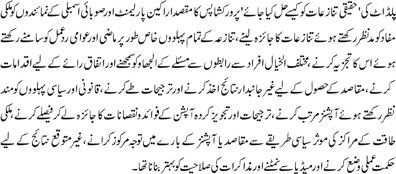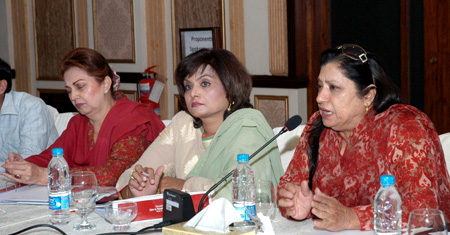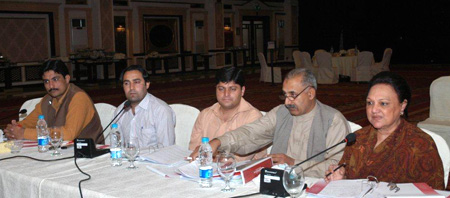|
|
| |
| EVENTS |
|
|
> To construct or not to construct Kalabagh Dam: agreement to continue dialogue
|
|
|
|
| |
Islamabad, March 21; Talks on whether or not Kalabagh dam should be constructed moved forward when Parliamentarians agreed to the demand of civil society�s representatives to construct Kalabagh dam and to continue dialogue to help remove trust deficit. |
|
| |
In an exercise to build conflict resolution and negotiation strategies for Members of Parliament and office bearers of major political parties, a mock simulation exercise was conducted by a seasoned instructor, Mohammed Feyyaz, who has extensive experience of leading similar workshops in renowned national institutions, based on a live issue of whether or not Kalabagh dam should be constructed.
|
|
| |
A background paper on Construction of Kalabagh Dam to assist the participants was also prepared which neither supports nor opposes the construction of Kalabagh Dam. |
|
| |
In order to carry out the mock exercise aimed at enhancing conflict management and resolution skills of the participants, they were divided into two groups: the proponents and opponents of the conflict. The two sides were briefed on how to understand the contours of a conflict and prepare negotiation points in each group. Actively assisted by the Conductor on the strategies of negotiations, the two sides faced each other on the negotiation table in a negotiation that went on for hours. Skilfully managed, the talks achieved meaningful result, though short of clear victory for either side, the opponents agreed in a media debrief after the talks, that the proponents had valid concerns about the lack of development of water resources and that talks must continue. |
|
| |
The workshop is the 2nd of the series of exercises being organised by PILDAT on How to Resolve Real Conflicts? to enhance conflict understanding, resolution and negotiation strategies among elected legislators and office bearers of major political parties through which participants will be trained through an opportunity to resolve a real issue, in a real time setting, through simulated role playing so as to generate meaningful solutions to the issue. |
|
| |
The PILDAT workshops on How to Resolve Real Conflicts? are aimed at helping Parliamentarians and provincial legislators to undertake pragmatic assessment of national interests and goals relating to a conflict; apply conflict and dispute analysis mechanism by reviewing all facets of a situation with particular focus on understanding and contextualising competitor(s) interests and positions keeping in view historical trends and behavioural patterns; understand intricacies involved in multi-lateral interaction and consensus-building in a multiparty fluid setting involving contentious issues; draw objective and relevant conclusions for evolving goals and identifying priorities; develop viable response options amenable to political, popular and legal demands; make decisions and judgments with thorough awareness of the cost and benefit of recommended strategic options and the priorities; draw upon and judicious application of instruments of national power to realize intended response option / objectives in a politically cost effective manner; plan contingencies to take care of unexpected outcome, and harness and hone media and negotiation skills. |
|
| |
|
|
| |
|
|
| |
|
|
| |
|
|
| |

|
|
| |
|
|
| |

|
|
| |
|
|
| |

|
|
| |
|
|
| |

|
|
| |
|
|
| |

|
|
| |
|
|
| |

|
|
| |
|
|
| |

|
|
| |
|
|
| |

|
|
| |
|
|
| |

|
|
|
|
|
|
|
|
|